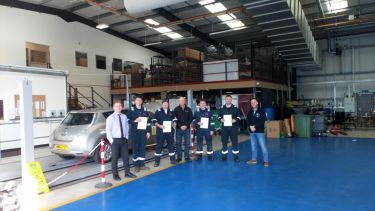
One year on from the global climate conference in Glasgow, what’s changed in Wales for workers?
The president of the conference, Alok Sharma, said it was an “historic agreement which kept the goal of limiting global warming to 1.5C above pre-industrial levels in reach.”
But one year on, what is the reality?
The Welsh Government has challenged public bodies to reach ‘net zero’ by 2030. By that point they should be producing fewer emissions from polluting greenhouse gases than they are absorbing. And, in Wales TUC’s view, they should be meeting these targets without placing extra costs – financial or otherwise – on workers.
Local council’s plans for net zero lacking worker voice
We’ve taken a look at every local council’s plans for getting to net zero. Some are better than others, especially in terms of protecting workers and their families as we decarbonise. The plans make interesting reading and contain exciting plans. For example, switching to electric vehicles forms a major part of most such proposals. But only a few councils referred to the importance of consulting with workers and providing guaranteed training so that workers can move to new green jobs.
That is why Wales TUC is working with trade unions to call on local councils and all employers in Wales to establish ‘transition agreements’.
These transition agreements should have key elements relating to decarbonisation and the workforce, including:
- Employers should consult regularly with unions on net zero planning and the impact on workforce related issues
- No worker is displaced as a result of net zero planning
- Workers must be supported and offered re-training if their posts are significantly affected or at risk due to decarbonisation plans
- Employers should consult regularly with unions on future skills needs and skills gaps
- Employers should be required to conduct regular equality impact assessments, at the start of a new decarbonisation project with regular reviews in between, which should be discussed with unions.
Workers must not pay the costs of decarbonisation
Both globally and locally, one of the greatest impacts on the net zero agenda has been Russia’s war in Ukraine which has led to global inflation. This has led to a world-wide cost of living crisis, which has been made worse in Wales due to the impact of Brexit, the UK government’s austerity policies and a decade of declining wages, impacting both the public and private sector.
When I hear from workers about the challenges of tackling global warming I am constantly reminded about the rising cost of living, with everything going up bar wages. Whether they work from home or at the office or out and about, workers are facing additional energy related costs. These range from bills at home, to the costs of getting to work. Their message is loud and clear: workers, especially the low paid and most vulnerable, must not pay the costs of decarbonisation. As a starting point, let’s get the national minimum wage rising to £15 an hour, bring retail energy companies under public ownership and let’s increase universal credit and pensions in line with inflation now.
Here in Wales, I am pleased that public bodies are committed to shifting from petrol and diesel vehicles to electric powered. But this is another example of an area where workers shouldn’t be shouldering the costs for doing the right thing.
They shouldn’t pay the costs of the shift to electric vehicles by losing their jobs in conventional vehicle maintenance. That’s why I’m so pleased that unions are leading the way in helping workers retrain in the new technology. For example, in Swansea, Unite the union worked with the council to retrain workshop staff on the new engines – saving jobs and costs for the council. This is a good example of progressive collaborative social partnership in action.
How you can get involved in tackling the climate crisis
The scale of the climate emergency can feel overwhelming. But, as trade unionists, we know that when we’re united we can make huge changes.
There are so many ways you can get involved in the fight for global climate justice in a just transition in your workplace.
- Join a Climate Justice Coalition rally on 12 November in Cardiff, Carmarthen, Swansea or Caernarfon
- Join the Wales TUC Greener Workplaces Network. We hold regular meetings for green reps, or anyone interested in this issue. The next on will be on 22 November where we’ll discuss the impact green energy could have on jobs in Wales. We also have a WhatsApp group where you can discuss green issues with other reps and activists. Email Stanley Wai Hong Ho for joining details.
- Attend the TUC’s online event on 17 November to discuss what trade unions can and should be doing to win a rapid and just transition to a safe climate future.
- Encourage your union rep to negotiate a just transition agreement at your workplace. Read Negotiating the future of work: Net-zero for more details.
Ready to take an even bigger role in greening your workplace? Attend our next 'green skills' for trade unionists course in 2023.

